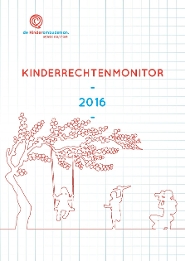Children’s rights monitor 2016
To what extent are the rights of children in the Netherlands guaranteed? On 13 December 2016 the Dutch Children’s Ombudsman has published the Children’s Rights Monitor 2016, a jubilee edition.

The Department of Child Law and the Institute of Immigration Law of Leiden University have drafted for the fifth year in a row the advisory report for the Children’s Rights Monitor.
The Monitor provides a thematic overview of the implementation of the UN Convention on the Rights of the Child (CRC) in the Netherlands. The special feature of this jubilee edition is that each chapter presents a flashback of the relevant developments in the past five years. In addition, the final chapter presents a look into the future. As in previous years, the monitor is divided in six chapters on the following themes: 1. Family situation and alternative care; 2. Protection against exploitation and violence; 3. Deprivation of liberty and juvenile justice; 4. Adequate standard of living; 5. Education; 6. Young immigrants.
Each chapter provides an overview of legislation, legislative changes, policy developments, relevant case law and insights from scientific studies. Next to the rights of children in the European part of the Netherlands, ‘the Netherlands in the Caribbean’, which consists of the islands Bonaire, St. Eustatius and Saba, is taken into account.
On the basis of the Children’s Rights Monitor 2016 and the four previous editions, three main areas of concern, with regard to the realisation of the rights of children are identified.
- Children deserve equal opportunities. This means that all rights must be effectively guaranteed by the CRC for all children within the jurisdiction of the Netherlands. It is recommended that in this context special attention should be given to children who are in need of care, children in conflict with the law, children who grow up in poverty, refugee children who have integrated in the Netherlands, but who do not qualify for a residence permit and children living in the Caribbean part of the Netherlands.
- A life free of violence for all children. Special attention should be given to children who are or may be victims of child abuse, vulnerable children who are at risk of being sexually abused online, children who are deprived of liberty, unaccompanied minors who have an increased risk of becoming victims of exploitation and child trafficking and children in the Caribbean part of the Netherlands who often have to deal with domestic violence and child abuse.
- Children have the right to participate. Children should be consulted when legislation and policies are drafted that affect them. More attention should be paid to the participation of vulnerable children, such as children who grow up in poverty, children in child care and protection and children in the Caribbean part of the Netherlands.
Finally, in the advisory report a number of general areas of concern regarding the realisation of children's rights within the Dutch Kingdom are formulated. First, the collection of disaggregated data and the monitoring of children’s rights are of importance in the Netherlands. The second issue is the decentralisation of youth care to the municipalities. Every child in need of care is entitled to care that is appropriate, of good quality and timely provided. The last point of attention is the increasing Europeanization of children’s rights.
Questions and suggestions can be directed at Prof. Ton Liefaard or the Secretariat of the Department of Child Law.
The Advisory report Children’s Rights Monitor 2016 (in Dutch)
The Children’s rights monitor 2016 of the Dutch Children’s Ombudsman
